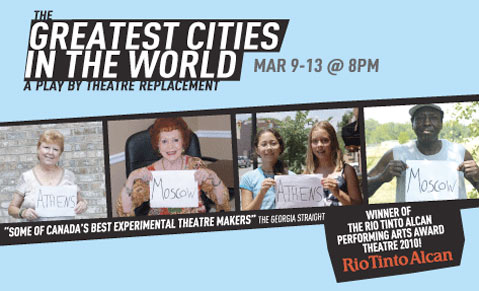
 |

THE GREATEST CITIES IN THE WORLD This is Jerry's review of the production from its premiere at the Cultch. Theatre Replacement’s new show, funded by the $60,000 Rio Tinto Alcan Performing Arts Award, is a surreal remix of documentary material collected by members of the company from interviews with people living in small-town Tennessee—in towns with the names of “the greatest cities in the world” like Athens, Paris and London. The result appears to have nothing whatever to do with those cities but much to do with the contrasts between Theatre Replacement’s own big-city multicultural artistry and the narrow black-and-white provincialism of the rural American South. To the company’s credit the show, directed by James Long and Maiko Bae Yamamoto, for the most part good-naturedly avoids cheap condescension. It’s also, for the most part, marvellously theatrical and entertaining. But it did leave me wondering what kind of statement is being made about the people of Tennessee who let the Replacements into their lives. Before a wall of rough wooden slats (designed by Jesse Garlick), the seven performers recite the words of their interviewees, sometimes in monologues, sometimes in choral set pieces. Sometimes we hear the recorded voices of the real people, and we see some of them in ghostly video projection. In two of those video sequences Tennesseans offer suggestions of simple physical actions such as touching your nose, mussing your hair, flapping your arms, hopping, falling down, etc. These become a movement vocabulary that the performers utilize throughout the piece; whether they are speaking or not, they hop, flap their arms, touch their nose, etc, constantly. Whatever is being said or heard is inflected by these nonsensical movements. As well, the actors are costumed in oddly archaic, cartoonish ways (courtesy of Allee Wells): a Shakespearean princess, a bishop, a gladiator. The result is silly and kind of sweet—and every so often severely jarring, as when Nneka Croal, a black actress, is reproducing a harshly racist interview. In an early sequence the performers introduce themselves to us and comment on their own ethnicity. In addition to Croal, brown-skinned Columbian Ruben Castelblanco and heavily accented Korean Young-Hee Kim in some ways comprise the primary lens through which the show filters its material. All the performers have strong presence and charm, and they never overtly parody or comment on their subjects. The other cast members are Andrew Laurenson, Michael Rinaldi, Susan Elliott and Tanya Podlozniuk. The latter two are trained dancers whose movements sometimes morph into dynamically choreographed sequences that I particularly enjoyed. The music is composed by Veda Hille and partly performed by the actors themselves on a drum set and synthesizer. In the early 1970s, Toronto’s Theatre Passe Muraille went into a rural community, interviewed its members, and then good-humouredly dramatized their ordinary lives in a theatrically compelling way that gave weight and dignity to those lives. The first performance of The Farm Show was in a barn in that community with the community itself as audience. It’s hard to imagine Theatre Replacement performing The Greatest Cities in the World for an audience of the Londoners, Parisians and Athenians who are its subjects. It’s also hard to imagine an entire new genre of Canadian theatre being generated by this show. But boy, it’s a lot of fun to watch. |
